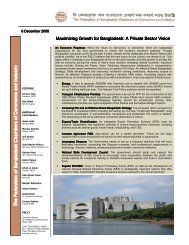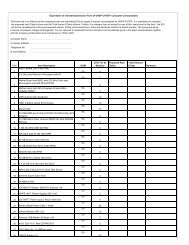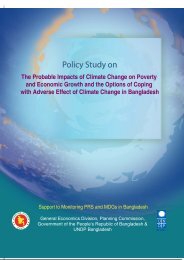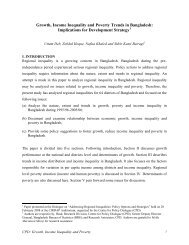Framework for a Strategy of UP Revenue/Resource Mobilisation ...
Framework for a Strategy of UP Revenue/Resource Mobilisation ...
Framework for a Strategy of UP Revenue/Resource Mobilisation ...
You also want an ePaper? Increase the reach of your titles
YUMPU automatically turns print PDFs into web optimized ePapers that Google loves.
(2) If house/building has more than one storey, consider all storeys as separate unit.<br />
(3) For shops, industries and other businesses larger than 100 sq ft (10m 2 ), and multi-storey<br />
residential blocks, either this method or annual rental value method may be used.<br />
(4) Add 105 tax <strong>for</strong> water facility on plots means <strong>UP</strong> supplied or served water.<br />
(4) Katcha here means mud and thatch. Tin-ro<strong>of</strong> is taken as being between katcha and semi-pacca.<br />
High quality means pucca construction with a high standard <strong>of</strong> finishing work.<br />
Table 1 shows the assessment values at various tax rates: 3%, 5% and 7%. Tabulations <strong>for</strong> 4% and<br />
6% could easily be prepared if required. The <strong>UP</strong> would choose which tax rate to set and there<strong>for</strong>e<br />
which table to adopt. The assessments in the table are based on estimates <strong>of</strong> the annual rental value<br />
using the construction cost figures produced by GoB’s Public Works Department (PWB). However,<br />
they are not precise valuations but they nevertheless provide a consistent basis <strong>for</strong> assessment.<br />
(Precise valuations are not required, <strong>of</strong> course: what matters is consistent treatment between all<br />
properties, so that the tax burden is distributed fairly.) One requirement <strong>for</strong> the new system to work<br />
properly is to remove the present tax ceiling <strong>of</strong> Taka 500 per building/land (non agricultural land).<br />
This ceiling is a serious anomaly because such a ceiling benefits only the rich and this ceiling was<br />
introduced in 1961 about 50 years ago. Inflation has eroded the value <strong>of</strong> Taka 500, so that annual<br />
rental values <strong>of</strong> larger properties, and particularly non-residential properties, are well above that<br />
ceiling. A particular issue arises with multi-storey blocks <strong>of</strong> rooms, where the assessment should be<br />
many times higher than Taka 500. 12<br />
There seems to be some ambiguity about whether holding tax applies to all property or only to<br />
houses. Most <strong>UP</strong>s do not appear to be collecting holding tax from non-domestic properties and<br />
some businesses refuse to pay on the groups that they are paying trade licence fees. 13 The LG (<strong>UP</strong>)<br />
Act, 2009 refers to buildings and land. It is, thus, clear that non-domestic properties are covered.<br />
There is, there<strong>for</strong>e, no reason why <strong>UP</strong>s are not collecting both holding tax and business licences<br />
from a business. Most non-domestic properties like shops will be covered by the mass appraisal<br />
system. There are some issues in relation to major public infrastructure, such as railways, power<br />
plants and power distribution systems. These issues need to be resolved at national level, since such<br />
facilities are generally state-owned and assessment <strong>of</strong> these sectors creates considerable problems.<br />
b. Improving <strong>Revenue</strong> Administration and Collection Per<strong>for</strong>mance<br />
12 This ceiling mainly benefit the rich and are not justified in a proper property tax assessment system.<br />
Ideally, they should be eliminated. However, adopting the mass appraisal system avoids these anomalies.<br />
13 There also appears to be an issue about exemptions from taxes <strong>for</strong> export industries. Although <strong>of</strong>ficially<br />
such exemptions only apply in a few export processing zones, it was claimed that some industries elsewhere<br />
refuse to pay local taxes on the grounds that they are producing <strong>for</strong> export.<br />
13










